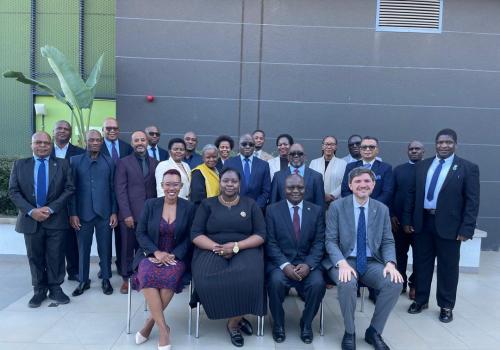The first Technical Committee (TC) meeting of the Southern African Development Community-European Union (SADC-EU) Programme on Enhancing the Capability and Effectiveness of SADC’s Peace and Security Architecture (ECESPA) was held on 10th of April 2025 in Gaborone, Republic of Botswana to review progress in strengthening the region’s peace and security architecture under the SADC`s Regional Indicative Strategic Development Plan (RISDP 2020–2030).
The ECESPA Programme which commenced in 2024 and will end in 2028 builds on previous initiatives the Regional Political Cooperation (RPC) Programme (2013-2018) and Support to Peace and Security in the SADC Region (SPSS) 2018-2024 and focuses on boosting SADC’s capability to respond swiftly to security threats and enhance collaboration with Non-State Actors (NSAs).
The objectives of the ECESPA Programme are to:
- Enhance the capability and effectiveness of SADC Peace and Security Architecture to enable early response and action; and
- Increase capacity of Non-State Actors (NSAs) to strengthen SADC’s Peace and Security Architecture.
The Technical Committee (TC) forms part of a robust governance structure of the ECESPA Programme, whose apex body is the Steering Committee (SC). The Technical Committee (TC) is tasked to, among other things:
- Review the Programme’s annual work plan, financial and progress reports, and make recommendations to the Steering Committee.
- Review progress in the implementation of the project and provide recommendations.
- Discuss the implementation of planned activities and make decisions relevant for the joint implementation of the project.
- Monitor and discuss risks relevant to the operational implementation and make joint decisions about adequate risk mitigation.
- Provide a platform for coordination with stakeholders, including the identification of synergies and complementarities with relevant programmes; and
- Ensure follow up and implementation of decisions taken by the Steering Committee.
In her opening remarks, Ms. Lilian Abdul Mukasa, representing the Chair of the Organ on Politics, Defence and Security Cooperation, emphasised the importance of EU-SADC cooperation amid evolving global security dynamics. She underscored the programme’s role in addressing challenges such as violent extremism, radicalisation, and external destabilising influences. Ms Mukasa further noted that the EU's commitment to supporting SADC underscores the resilience of its historical partnership with SADC.
Representing the EU Delegation, Mr. Clement Boutillier, Chargé d’ affaires and Head of Cooperation, reiterated the EU’s support for regional integration and peace, highlighting ECESPA’s focus on conflict prevention as a cost-effective strategy that ensures Value for Money (VfM).
Mr. Denise Rweyemamu, Acting Director of Policy, Planning and Resource Mobilisation at the SADC Secretariat, highlighted the ECESPA Progrmme`s integrated approach, fostering synergies between early warning systems, mediation, and conflict prevention frameworks, while tackling key threats including Transnational Organised Crime (TOC), gender inequalities, Gender-Based Violence (GBV), Conflict-Related Sexual Violence (CRSV), radicalisation, the Prevention of Violent Extremism (PVE), terrorism, and various human security threats.
The TC plays a vital role in reviewing implementation progress and providing recommendations. Its outcomes will inform the next Steering Committee (SC) meeting, scheduled for July 2025 in the United Republic of Tanzania.

